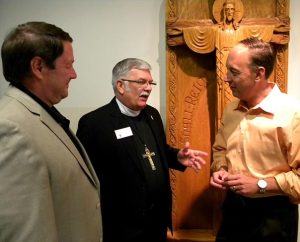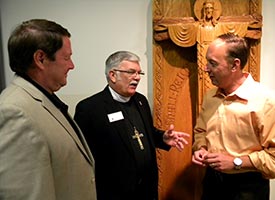By Joe Isenhower Jr.
ST. LOUIS — The Synod’s Board of Directors — meeting here Sept. 14-16 — elected its officers for the 2013-16 triennium and took a number of other actions; reviewed Board responsibilities, procedures and related matters as orientation for this triennium; and heard reports from LCMS leaders and from those who head the staffs of the Concordia University System and Concordia Plan Services.

Board members began their time together here by participating in the Sept. 13 Synod President’s Leadership Meeting, which had the theme of “Into the Future: A New Triennium” (click here for related story).
The next afternoon — following the installation of Synod officers for the triennium (click here for related story) — Board of Directors members began their meeting by individually introducing themselves, primarily for the benefit of two “new” members elected by delegates to this summer’s LCMS convention. They are Kathy A. Schulz of Augusta, Mo., and Christian A. Preus, Plymouth, Minn. Preus previously served on the Board in the years 1995-2007.
The Board elected its three officers for the triennium: the Rev. Michael L. Kumm, senior pastor of Trinity Lutheran Church, Millstadt, Ill., chairman; Ed H. Everts, a retired bank officer from Daytona Beach Shores, Fla., vice-chairman; and Dr. Kurt M. Senske, chief executive officer of Lutheran Social Services of the South, Inc., Austin, Texas, member at-large of the BOD executive committee.
“I am humbled by your confidence,” Kumm told the Board after those elections. “My prayer is that we will be as collegial as the Board was in the previous triennium, and that all that we do together will be to the glory of God.”
Later in the meeting, members were named to serve on the Board’s three committees. And after the plenary meeting ended, those committees met and elected the following to serve as their chairmen: Keith Frndak of Cabot, Pa., for the Audit Committee; Warren Puck, Manning, Iowa, Personnel Committee; and Senske, Governance Committee.
Other actions
In other actions, the Board of Directors approved:
- a proposed energy-upgrade project at Concordia University, Nebraska, Seward, and loan financing of no more than $1.75 million for that upgrade. The project is intended to “improve the energy efficiency and reliability on the campus,” according to the resolution that also notes the company providing the upgrades “will guarantee that savings in energy and maintenance costs exceed financing costs.”
- a number of changes to the bylaws of The Lutheran Church—Missouri Synod Foundation, pending approval of the LCMS Commission on Constitutional Matters.
To fill three positions on the Concordia University System Council of Members, the Board appointed Myrna Baneck of Mandan, N.D.; Mark A. Kalthoff, Allen, Mich.; and Bethany Kilcrease, Grand Rapids, Mich.
The Board also appointed several individuals to fill vacancies as members at-large of the LCMS Foundation. To serve three-year terms, they are Kurt A. Battles of Arden Hills, Minn.; Jamison J. Hardy, McMurray, Pa.; Marilyn Langemeier, Bridger, Mont.; Judy May, Fort Wayne, Ind.; Robert F. Shonholz, Fort Wayne, Ind.; and alternate Mark Moksnes, Chanhassen, Minn.
Officer reports
Synod Secretary Rev. Dr. Raymond Hartwig led discussion of Board of Directors responsibilities specified in the Synod Bylaws.
“One Bylaw may be most helpful for understanding all the others,” Hartwig said in reference to Bylaw 1.2.1, which gives definitions of terms found in the Synod Handbook. The Handbook contains the Synod’s Constitution and Bylaws.
Hartwig advised Board members to pay close attention to the definitions of “supervision” and “oversight” — two responsibilities of the Board in a number of areas, and then gave several examples of those responsibilities.
He suggested that the Board “take more time” to study its responsibilities.
Board member Gloria Edwards voiced support for studying the Board’s oversight and supervision responsibilities, noting that the Board had not discussed the matter in recent years.
Hartwig also spoke about the Board’s responsibilities concerning ownership of property.
Chief Administrative Officer Ron Schultz led discussion about actions of the 2013 Synod convention that involve the Board and provided an overview of the Board’s policy manual.
LCMS Chief Financial Officer Jerald C. Wulf gave an overview of the financial aspects of the board’s responsibilities and how members will receive such information at and between their meetings.
In his report, Synod President Rev. Dr. Matthew C. Harrison provided a review of actions of the 2013 Synod convention, for which he noted “there were not many close votes.”
He said he was “really gratified” to hear Schultz say it was “the smoothest convention he’d seen.”
Among other matters, Harrison noted demographic studies he had requested from the Synod’s Rosters and Statistics department regarding LCMS districts. He said that his goal is to help the Synod come to a much more precise understanding of the reasons for the decline in LCMS membership over the past 40 years.
“There are a lot of cliches regarding, or alleged causes for, our decline which are simply myths, not validated by the data,” Harrison said. “If we are going to better address these issues, we have to separate fact from fiction.”
He noted that such factors as postponement of marriage and the dwindling size of American families continue to appear to be the greatest factors in these declines. But he also said that the growth of secularism has been a key factor and that he believes “what we have experienced is just a prelude to continuing secularization, that is a culture against Christ and the church.”
“Our theology is great,” Board member James Carter told Harrison. “So, why aren’t we doing better?” Carter asked. “In addition to the demographics,” he added, “I think it’s because we are counter-cultural. Kids in public school have been taught the opposite of our beliefs about the sanctity of life, marriage, creation and God’s character. Our own kids are having a tough time.”
“That’s a huge factor,” Harrison responded. “The culture is heavy upon us.”
However, Harrison continued, “If you want to get buoyed, go to an LCMS Youth Gathering,” referring to the “Live Love[d]” event which drew some 25,000 Lutheran youth and adult leaders to San Antonio this summer.
Synod Chief Mission Officer Rev. Gregory K. Williamson echoed Harrison’s positive take on the Youth Gathering in his report to the Board.
“I was very impressed with the positive witness our young people made to the community,” Williamson said of the Gathering.
Harrison also spoke of the positive influence of annual Higher Things conferences that emphasize a “more intense catechetical approach,” such as those this summer that also attracted thousands of LCMS teens and adults.
And he pointed out that the LCMS Office of National Mission has been “paying close attention to campus ministry,” bringing to the table a united approach from several campus-ministry organizations, with emphasis placed on confessional Lutheran apologetics. The result is a new campus organization — “LCMS U.”
Of the national and international Lutheran landscape, Harrison spoke of “the growing interest among many confessional and emerging confessional churches” for closer relationships with the Missouri Synod.
“We have a lot of capacity and strength amid our weaknesses and challenges,” he told the Board.
CUS, CPS overviews
The Rev. Dr. Alan Borcherding, interim president of the Concordia University System, provided the Board with an overview of that system which includes the 10 Concordia university and college campuses.
Borcherding said that “unofficial reports” indicate that the total CUS enrollment this fall will reflect a 7-percent increase over fall enrollment a year ago. He also said that the Board should be “very proud of how our campuses have lowered their short-term borrowing.” And he noted that the merger of Concordia University Wisconsin, Mequon, and Concordia University, Ann Arbor, Mich., occurred “very smoothly” in July.
During the Board’s final Sept. 16 session, Concordia Plan Services (CPS) President and CEO James F. Sanft provided an update on Concordia Retirement Plan changes announced in March and that take effect July 1, 2014; and on health-care reform.
Sanft noted that many and varied communications from CPS about the retirement-plan changes emphasize that “it’s really about preserving the core and sustaining the plan for the future.” He also noted that those changes were to “extra benefits, not with that core,” and that CPS communications “remind people of the long-term nature of the retirement plan and why it’s important that we’re making smaller changes now to keep us on a solid path.”
“In general,” Sanft said, “I’d say there’s been great support and even appreciation for the fact that we saw on the horizon the potential challenges with the management of the retirement plan and are taking action — and that you [the LCMS Board of Directors] took action following the Concordia Plan Services board.”
Sanft spoke of health-care reform and its “key implementation date” of January 2014.
“For 2014, [CPS’] strategy is really to stay the course and provide our members and our ministries a seamless transition to the post-health-care-reform world.”
The next meeting of the Board of Directors is Nov. 20-22 in San Antonio.
